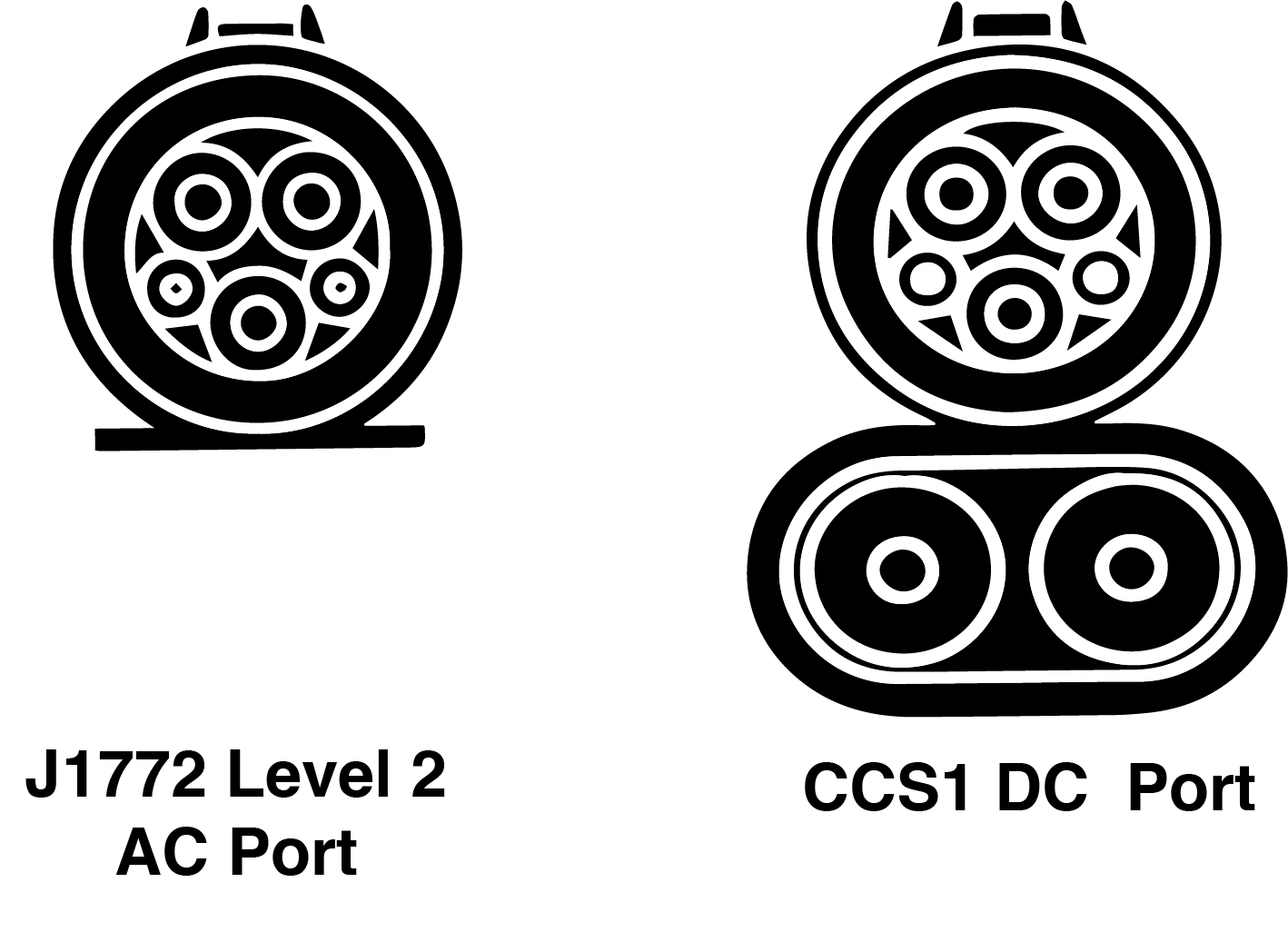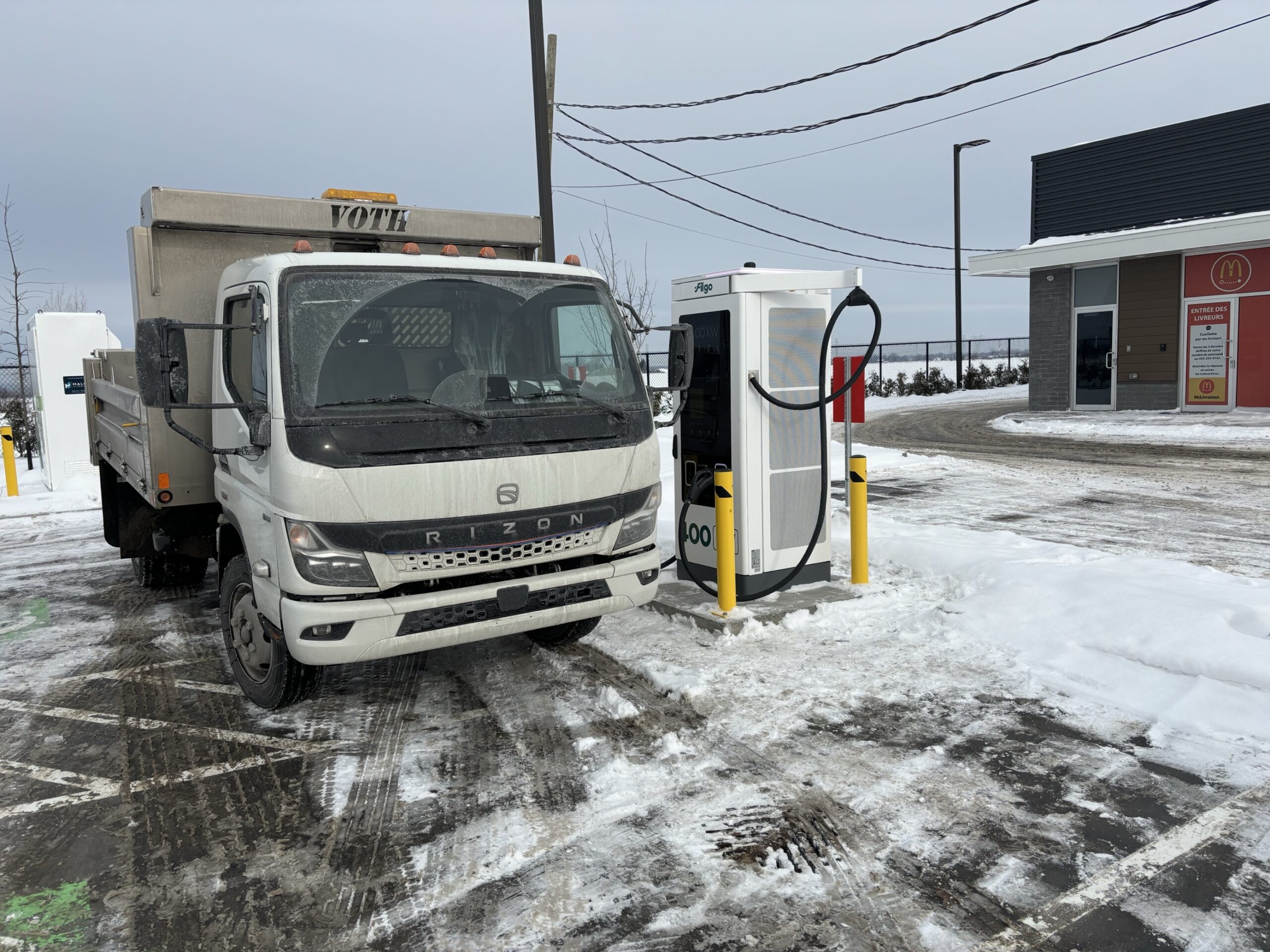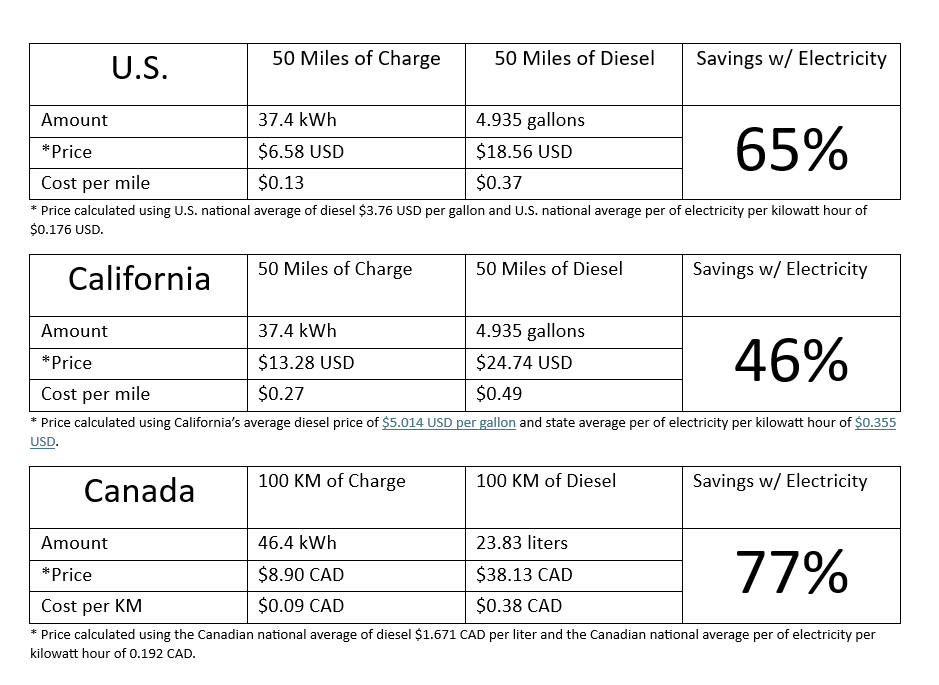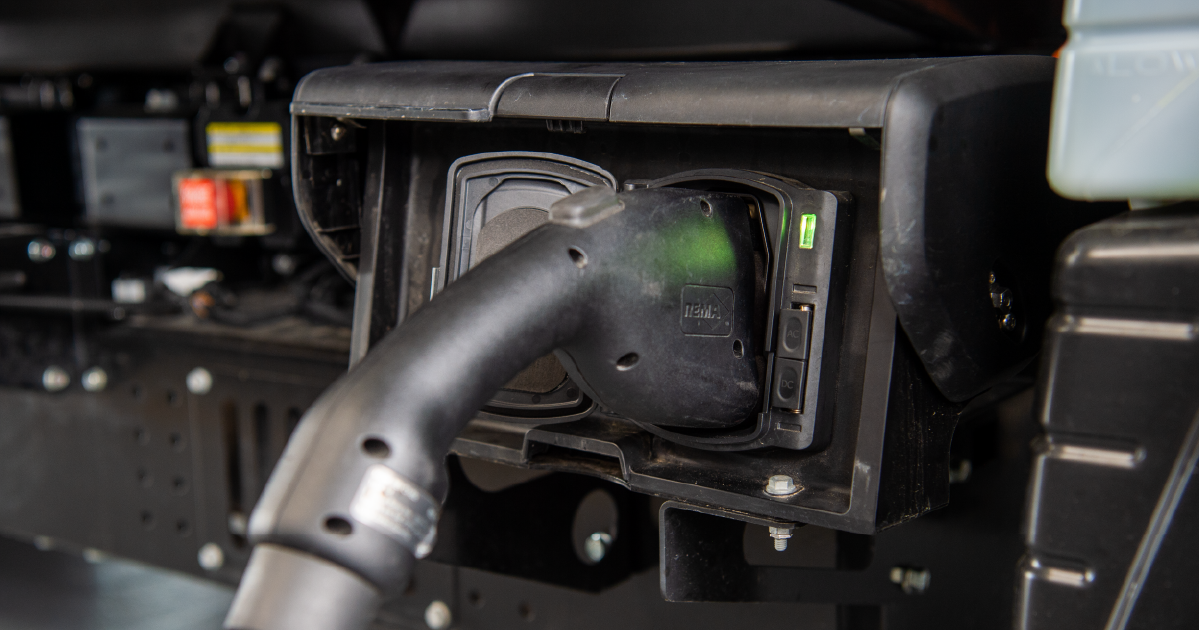The cost to charge EVs is usually cheaper than gas or diesel, which is why many buyers go electric.
But how much cheaper?
In this article, we’ll compare the fuel cost of driving 50 miles in the U.S. and 100 km in Canada using a comparable Class 5 diesel truck with that of a RIZON electric truck to help you understand how each option impacts your bottom line.
Since California leads the U.S. with the most registered trucks, we included the applicable rates below.
Models Used for Comparison When Calculating the Cost to Charge EVs and the Price of Diesel

This comparison uses the RIZON e18L featuring 124 kWh of installed (116 kWh of usable energy) and a 155-mile or 249 KM range. The diesel truck is a comparable Class 5 diesel truck model in the North American market with an average fuel efficiency of 10.13 miles per gallon or 4.38 KPL.
Methodology Behind the Calculations
RIZON Electric Truck Fuel Cost Calculation
The RIZON e18L features 124 installed ( 116 kWh of usable energy) and a 155-mile range. The range calculations are made under standard testing conditions with a 50% payload. The range may vary based on environmental conditions, battery health/charge level, recuperation usage, road traffic conditions, and driving styles.
It’s important to note that we based these rates on level 2 AC charging which is typically done at a vehicle’s home base during a vehicle’s downtime. DC fast charging uses the CCS1 charge port, and is typically conducted at external charging stations and is more expensive.
Here’s how we calculate the cost of driving 50 miles using the 2024 U.S. national average electricity price of $0.176 per kWh:
▪️Energy consumption per mile = 116 kWh ÷ 155 miles = 0.748 kWh per mile
▪️Energy needed for 50 miles = 50 miles × 0.748 kWh/mile = 37.4 kWh

The Price of 50 Miles of Charge in the U.S.
▪️Cost to drive 50 miles = 37.4 kWh × $0.176 per kWh = $6.58 USD
The Price of 100 KM of Charge in Canada
The cost adjusted for 100 KM of charge using Canada’s national average per kWh of 0.192 CAD is 0.192 would be as follows:
The energy needed for 100 KM is approximately 46.4 kWh.
▪️Cost to drive 100 KM = 46.4 kWh × $0.192 per kWh = $8.90 CAD
Class 5 Diesel Truck Fuel Cost Calculation
Price of Driving 50 Miles with Diesel in the U.S.
For a Class 5 diesel truck with an average fuel efficiency of 10.13 miles per gallon and the U.S. national diesel price of $3.76 per gallon, the cost calculation is as follows:
▪️Fuel needed for 50 miles = 50 miles ÷ 10.13 mpg = 4.935 gallons
▪️Cost to drive 50 miles = 4.935 gallons × $3.76 per gallon = $18.56 USD
So, it would cost approximately $18.56 USD for the diesel truck to drive 50 miles.
Price of Driving 100 KM Using Diesel in Canada
A comparable Class 5 diesel truck with an average fuel efficiency of 4.38 LPK and the Canadian national diesel price of $1.671 CAD per liter, the calculation is as follows:
▪️Fuel needed for 100 km = 100 km ÷ 4.38 KPL = 22.83 liters
▪️Cost to drive 100 km = 23.83 liters x 1.67 CAD = $38.13 CAD
So, it would cost approximately $38.13 CAD for the diesel truck to drive 100 KM.
Variables Affecting the Cost to Charge EVs and Fill Diesel
Location
▪️Prices for both electricity per kWh and diesel per gallon will be different per state or province.
For example, customers in Louisiana pay an average of 11.23 cents per kWh whereas the rates in Hawaii are 40.2 cents per kWh.
Canadians living in Québec pay on average 7.8 cents per kWh compared to 25.8 cents in Alberta.
▪️Diesel prices also differ considerably depending on the state or province.
For example, a gallon of diesel in California costs about $5 per gallon compared with $3.13 in Oklahoma, as of March 2025.
The retail price for diesel in Vancouver is $1.92 CAD per liter compared with $1.66 CAD per liter in Toronto.
For a more accurate estimate, it’s recommended that you calculate using your local rate with the above equation.
AC electricity rates for the U.S. by state
AC electricity rates for Canada by province
Charge Type

It’s important to note that the above kWh calculations for the price of electricity are based on AC charging rates at owner facilities.
DC fast charging is inherently more expensive. So, if your operations are dependent on a mid-shift charge using a fast-charging station, the cost of electricity will rise.
DC Fast Charging Pricing
The average price for DC fast charging across the U.S. at the time of this writing is $0.346 per kWh.
In Canada, pricing for DC fast charging is a bit more complex with some charging stations offering time-based billing and others offering kWh-based billing. However, pricing sampled from last year from charging stations offering kWh billing averaged out at $0.458 CAD, pre-tax.
Here’s a breakdown.

The more you utilize DC fast charging, the less the savings as the price of 50 miles of charge via DC fast charging using the national average becomes $12.90 USD. The price for 100 km of charge in Canada jumps to $21.25 CAD.
When to Use AC or DC Charging Options
Typically, drivers use AC for EV charging during off hours assuring the vehicle is fully charged at the vehicle’s home base.
DC charging is best utilized to top-up a vehicle’s batteries during a break in driving if longer routes are planned.
The bottom line is the more you use AC, the cheaper charging becomes.
Learn more in our quick guide to AC vs. DC charging.
Temperature and Driving Conditions

Photo credit: GLOBOCAM
Temperature affects an electric vehicle’s range. EVs perform best around 70°F or 21 °C. Batteries need to be brought to ideal operating temperatures, which trims their range.
However, you can use the battery-precondition function to mitigate the effect. Batteries can be heated in advance if the driver sets the vehicle’s preconditioning function while the vehicle is charging.
On the other hand, diesel vehicles are also susceptible since they need to be warmed before driving in the cold. Some estimates suggest 10 minutes of idling in below-freezing conditions before beginning operations.
Naturally, this adds to the cost for both drive types.
Environmental Considerations
Electric commercial trucks, such as the RIZON truck, offer distinct advantages, particularly for urban logistics. These vehicles help reduce noise pollution, which is a growing concern in cities. Since EVs operate quietly, they contribute to a more peaceful environment, especially during last-mile deliveries, which providers often conduct during off-peak hours.
Additionally, electric trucks have zero tailpipe emissions, making them an ideal solution for reducing the carbon footprint of urban fleets. While the energy used to charge EVs may come from various sources, as cities move toward cleaner energy grids, the environmental impact of electric trucks continues to improve. By adopting electric vehicles for urban logistics, businesses can lower both fuel costs and their environmental impact.
The Cost to Charge EVs Offers Real Savings

When comparing the costs of operating a RIZON electric truck and a Class 5 diesel truck, the financial benefits of operating electric vehicles can provide savings depending on the use case and local diesel and electricity rates and charging type.
What’s more, the conveniences provided by charging include lower vibration and more comfort for drivers, reduced noise pollution, and skipping fueling stations.
RIZON trucks are driving on American and Canadian streets helping businesses by providing zero-emission solutions.
Download a brochure for more information including full specs for each model.


